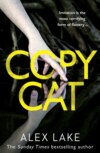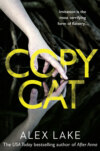Kitabı oku: «After Anna»


Copyright
Published by HarperCollinsPublishers
1 London Bridge Street
London SE1 9GF
First published by HarperCollinsPublishers 2015
Copyright © Alex Lake 2015
Alex Lake asserts the moral right to be identified as the author of this work
Cover layout design © HarperCollinsPublishers 2015
Cover photographs © Shutterstock.com (sky); Cherie Chapman (girl on swing)
A catalogue record for this book is available from the British Library
This is a work of fiction. Any references to real people, living or dead, real events, businesses, organizations and localities are intended only to give the fiction a sense of reality and authenticity. All names, characters, places and incidents are either the product of the author’s imagination or are used fictitiously, and their resemblance, if any, to real-life counterparts is entirely coincidental.
All rights reserved under International and Pan-American Copyright Conventions. By payment of the required fees, you have been granted the non-exclusive, non-transferable right to access and read the text of this e-book on-screen. No part of this text may be reproduced, transmitted, down-loaded, decompiled, reverse engineered, or stored in or introduced into any information storage and retrieval system, in any form or by any means, whether electronic or mechanical, now known or hereinafter invented, without the express written permission of HarperCollins e-books
Ebook Edition © JULY 2015 ISBN: 9780008150907
Version 2018-11-09
To my three musketeers: O, F and A
Contents
Cover
Title Page
Copyright
Dedication
Prologue
PART ONE: BEFORE
Chapter 1: Life Is Complicated
Chapter 2: The First Hours
Chapter 3: The First Day
Chapter 4: The Second Day
Chapter 5: The Third Day
Chapter 6: The Fourth Day
Chapter 7: The Fifth Day
Chapter 8: The Sixth Day
Chapter 9: The Seventh Day
PART TWO: AFTERWARDS
Chapter 10: Back Home
Chapter 11: Not Over Yet
Chapter 12: Losing Control
Chapter 13: Legal Questions, Moral Questions
Chapter 14: Doll’s House
Chapter 15: Home Time
Chapter 16: A Necessary Evil
Chapter 17: War of the Roses
Chapter 18: A Month Later
Chapter 19: Two Months Later
Chapter 20: An Hour Later
Acknowledgements
Keep Reading …
About the Author
Also by Alex Lake
About the Publisher
Prologue
It was easier than you had expected. The girl came without complaint. You spotted her as she left the school, alone, looking around, clearly bereft of a parent to pick her up. Who would do that? Who would be so negligent as to leave a five-year-old in such a vulnerable position? It was appalling, it really was.
But it was good for you.
Not so good for her, and definitely not so good for her poor, soon-to-be grief-stricken, self-hating parents, but good for you.
No one saw you. You were sure of that. You’d been watching them closely. Watching them mill around the school gates, waiting for their spoiled progeny to emerge so they could pepper them with inane questions.
How was your day? What did you learn? Were you a good girl, my princess? Were you a brave boy?
They were raising a generation of precious, weak children, who thought the world revolved around them, that it would adapt itself to their whims, would always allow them to win and never force them to struggle. It was a silent disaster, and it was creeping into every corner of society and no one was doing anything about it.
Except you. You are going to do your part to stop it, however small that part is.
And it starts with the girl.
She is yours now. Now, and forever. You like things to be yours. You have never been good at sharing. You would rather destroy something than share it. You know it is not your most attractive trait, but you don’t fight it. There is no point. It has always been that way.
And you will not share her. She is yours. Vanished into your car; traceless.
It has gone very, very well. As well as could have been expected.
You have to admit to being a little bit pleased.
You have to admit that you allowed yourself a pat on the back.
Have you been lucky, even? Maybe. You need luck. Everyone does. You are no different, at least not in that regard. In some others, yes. In some other ways, you are very different. Better. More clear-sighted. More decisive.
So maybe it wasn’t luck, after all. No, you don’t think it was. It was down to good planning. Yes, you prefer that. It was down to good planning. And ability, of course. Nerve and skill. It was you who’d done it, you who’d made it happen. Luck was not part of it.
Not that you are becoming complacent. That would not do. That way, disaster lies. Complacency is the path to failure. And you did not take the girl, did not get this far, to fail at the last.
So now she sleeps, the girl, dark-haired and beautiful and young, she sleeps in the back seat of your car. She is drugged, hidden away from prying eyes until the time comes for you to use her for the purpose for which you took her. For the purpose that meant you had to take her. It is a shame she has to be involved in this; a shame that she will pay the price for what others have done. It isn’t fair, you know that, but then the world isn’t fair. Life isn’t fair. You know that, too. Fair doesn’t come into it. Does the wolf slaying the lamb worry about fairness? About wounded innocence? No, it cares only about its hunger. There is no fair or unfair for the wolf. The wolf takes what it needs, and its need is the only justification necessary. Right, wrong; fair, unfair: they play no part in its world.
And they play no part in yours either. There is only strong or weak, winner or loser. The cry of it’s not fair is just a tool the weak use to constrain the strong. You cannot let it influence your actions.
And you don’t. You didn’t. You won’t.
Fair does not come into this.
Fair is for the weak.
For the losers.
As you drive away you allow yourself a smile. Apart from anything else, this is going to be fun.
PART ONE: BEFORE
1
Life is Complicated
i.
She was going to be late. Again.
Julia Crowne looked up at the clock on the wall of the boardroom. It was one of those Swiss railway clocks, with the blocky minute and hour hands. She happened to know that it was not an imitation; it was the real thing. It went with the polished wood of the oval conference table and the comfortable leather chairs. Nothing but the best for the boardroom. The clients they met in here were reassured by that kind of thing.
Two forty p.m. The meeting about the custody of a child was supposed to be over by now, but it had not gone well, mainly because her client, town councillor Carol Prowse, was being unreasonable. It was understandable, since she had come home to find her husband, Jordi, a poet and part-time English teacher, in bed with one of his former students, but it was not making things easy.
Under the table Julia’s foot tapped nervously. She had to pick up her five-year-old daughter, Anna, from school at three p.m., and she couldn’t be late. They had an appointment at three thirty to collect a cocker spaniel puppy from a woman who had been surprised when she woke one morning to plaintive cries and came downstairs to find that her dog – who had been suffering from a mysterious listlessness for the last week – was producing puppies at an astonishing rate.
The woman was a nurse and she worked the late shift; she had agreed to wait until three thirty, but that was as long as she could hold on. Julia and Anna had spent hours getting ready for the puppy: buying the bed, choosing where to put it, selecting the name (Anna had settled on Bella, which Julia thought was a fine name for a puppy), stocking up on dog treats, planning where they would take her for walks, and Julia did not want to have to deal with the disappointment that would follow if she had to tell Anna that the puppy would not be coming home that evening after all.
Even more than that, Julia needed the puppy to be a source of nothing but joy and affection, because she was going to be facing her own custody battle soon enough and, if it was anything like Carol Prowses’s, Anna would need all the distractions she could get.
Julia hadn’t found Brian in bed with one of his students – thankfully, since he taught in a junior school – or with anyone else, for that matter. If she had she probably wouldn’t have cared, which was exactly the problem. She liked Brian. She thought he was a good man and a good dad and a good husband – well, an OK man and an OK dad and an OK husband – but she just wasn’t inspired by him; no, it was worse, she wasn’t interested in him. He was like a work acquaintance that she knew in passing but didn’t really care about. The kind of acquaintance whose troubles you might hear about – did you hear Brian’s getting a divorce? – and think it was a shame but it wasn’t really any of your business. That was how she felt about Brian. He just didn’t belong in her life anymore.
It hadn’t always been like that. For a while she had kept a photo of her and Brian on the first day of their honeymoon on her desk at work. They were on a white sandy beach on the Greek island of Milos. They had just finished eating a meal of grilled fish and the sun was setting behind them. She’d asked the waiter – a Greek fisherman who doubled up as a beachfront restaurant owner in the evening – to take it.
Afterwards, they stood, arm in arm, facing the sea.
This is heaven, she said. It’s amazing. The world is such a magical place.
Brian laughed. You sound like you’ve been smoking too much dope. Like when we used to get stoned and stare up at the stars.
But this is real, Julia said. It really is heaven. Our feet in the water, nothing to worry about for the next two weeks. And nothing to do right now but go back to our room …’ she kissed Brian’s cheek, taking note of his muscular arms and flat stomach, then ran her hand through his salt-stiff hair, ‘where we can see if we can find a way to spend a few hours of our honeymoon.’
They were so at ease with each other then, so tight, so intertwined. But that was all gone now. Somewhere along the way they had taken different paths, started seeking different things in life. They hadn’t noticed at the time, hadn’t seen that they were slowly diverging, until it was too late. Looking back, Julia thought it had started around the time Anna was born. She was their only child, and the only one they were likely to have given how hard it had been to get her, and she deserved a dad who invented wild stories and made treasure hunts and drew and painted and created with her. A dad who injected energy and wonder and awe into her world.
Brian loved her, of course he did. He doted on her. But he never suggested that they try anything new, that they go camping on an island in a lake or to the seaside or to see a play. He didn’t build an obstacle course in the garden or put on plays in an Anna-sized theatre or assemble a trampoline and hold the Crowne Mini Olympics. Instead, he bought her the same pink Lego sets and Disney-branded dolls that every other girl her age owned. He was content for Anna to live her life in the narrow suburban confines he had allowed himself to become enmeshed in. It was too normal for Anna, and, for that matter, for Julia. She wanted more, and Brian could not provide it.
He was, truth be told, a bit boring, although Julia would never have put it that way to him.
Or at least, she hadn’t intended to, but when she’d told him a month back that she was considering their future together – specifically, whether they had one – he’d not taken it well, and they’d spiralled into a vicious argument. She’d ended up saying things she now regretted, but once things are said they have a habit of staying that way, and all you can do is live with the consequences.
You’re a bit, you know, a bit – she’d been thinking boring, but she managed to find a euphemism just in time – a bit mainstream.
Her attempt to soften the blow didn’t work. Brian clenched his jaw.
Mainstream? he’d replied. You mean boring, don’t you?
Stupidly, with two glasses of white wine lubricating her anger, she’d nodded.
She said a few more things she hadn’t been planning to share, like the fact that she didn’t want her life to drift by, empty of inspiration and wonder. Or the fact that she was sick of doing the same things every weekend, going to the same places every holiday, eating at the same restaurants. She wanted more, she wanted adventure and romance and colour.
You’re just having a bloody midlife crisis, Brian said. I thought it was me that was supposed to get scared about life leaking away and spend our savings on a sports car and have an affair with a bimbo.
And then she said the thing she really regretted.
I wish you would, she’d said. At least I could find something interesting in a man who had some fight in him. You’re ready for the pipe and slippers phase already.
What, he said, suddenly red-faced. What did you say?
She repeated herself. That you’re ready for your pipe and slippers. Julia found it odd that this, of all she’d said, was the thing that he was particularly exercised by, but his reply enlightened her.
Not that, he said. Not the bloody pipe and slippers. You said you could find something interesting in a man with some fight in him. So I’m not even interesting to you?
Julia realized that she hadn’t been making that statement – it had just kind of slipped out – but now it was said it was exactly what she meant. So she nodded.
You can think I’m boring, Brian replied, and lacking inspiration, or whatever it is you’ve read on Facebook that you should be looking for, I can accept that. What I can’t accept is you saying that there’s nothing about me that deserves your interest. Not your respect, and not, heaven forbid, your love, but your interest. If that’s the case it really is over.
And she had agreed. She told him he had put it well. That he really understood the situation.
Since then they had barely spoken. Brian slept in the guest room; she stayed in their room. On the few occasions they had been unable to avoid sharing words they had not discussed their future, until about ten days ago, when she had told him she’d made up her mind. She wanted a divorce.
Which was what Carol Prowse wanted, and would get. The problem was that she also wanted her husband only to have custody of their nine-year-old son when supervised. Her demand was ridiculous and vindictive, and it would never be granted.
Jordi Prowse had shaken his head when Julia said it, and now he was laughing.
‘Forget it,’ he said. His hair was greying at the temples and he had a relaxed, easy manner. ‘That’s simply unthinkable. There’s no grounds for that.’
There was a long pause. Carol Prowse looked at Julia. ‘That’s not what my lawyer thinks.’
That was what her lawyer thought, but it was not what Councillor Prowse wanted her to say. Julia glanced again at the time. Two fifty. She needed to wrap this up.
‘Given the age of the girls you were having an affair with I think that there are grounds to argue that you are not fit to be left in charge of a child,’ she said. ‘Moral grounds.’
His lawyer, an old friend of Julia’s called Marcie Lyon, shook her head. ‘There’s no way that’ll fly,’ she said. ‘You know that.’
Jordi grinned. ‘You’re just feeling humiliated,’ he said. ‘So you’re making empty threats.’
Carol Prowse stiffened in her chair. Julia had been here before, this could get ugly. It was the way that custody battles went. Both parties went in with the best intentions to reach an amicable settlement; both parties ended up locked in a battle for their kids, which ripped whatever was left of their relationship to pieces. But she couldn’t wait around to see this one. She looked at the clock again. ‘I think,’ she said, ‘that we might have achieved all we are going to achieve today. I would suggest that Ms Lyon and I meet later in the week to discuss the case.’
Jordi West shrugged. ‘Sure,’ he said. ‘You can meet and discuss how stupid her—’, he nodded at his wife ‘proposal is.’
Julia smiled. ‘We’ll discuss many things, I’m sure,’ she said. ‘Can we consider this meeting over?’
She had to get out of the room. She had accepted that she was not going to make it in time to pick up the puppy – it was a twenty-five-minute drive to the school, then another half hour to the lady’s house – but now she had a more pressing concern. She needed to call the school and tell them she was running late so they could hold Anna back. She got to her feet, aware that she was rushing the three other people in the room. Marcie gave her an odd look as she left; Jordi didn’t look at either Julia or her client.
Carol Prowse shook her head. ‘Can you believe that?’ she said. ‘He’s so damn arrogant.’
Julia could see that her client was in the mood to debrief, and normally she would have provided the sympathetic support she wanted, but right now that was simply not an option. She nodded agreement. ‘I’m sorry,’ she said. ‘I have to go. It’s my day to pick up my daughter from school.’
God, it sounded lame. This was the problem. She was expected to be a model professional, focused on her career, which meant she was at the beck and call of her clients, as well as being a model parent, which meant she was at the beck and call of her daughter. It was impossible to be both, but that didn’t lessen the expectation any.
In the corridor she took her phone from her bag and pressed the button.
The screen was black. It was out of battery.
She swore quietly. She fished around in her bag for a charger. Not there; of course not. It was in the car. She could run up to her office and call from there, but it was on the other side of the building. No – the quickest way was to get to the car and charge it there.
She hurried down the corridor. She didn’t doubt everything would be fine, but she still didn’t like the feeling of being late to pick up her daughter.
ii.
As she drove away from the office, Julia tapped her finger on the logo at the centre of the screen of her phone, even though she knew it would not shorten whatever process it went through when it switched on. She did the same thing when waiting for a lift; if it was slower to arrive than expected she would press the call button again. And sometimes again.
Won’t come any faster, some wag might say, and she’d reply, with a thin smile, well, you never know.
Come on, she thought. Come on.
This had happened before, resulting in an uncomfortable encounter with Mrs Jameson, the retired teacher who stayed after school with the children whose parents had neglected to turn up on time. It was going to happen again today. There’d be the stern, disappointed look, then the gentle reminder of school policy.
Mrs Crowne, I realize you are busy but could I remind you that the school cannot provide after-hours childcare without prior arrangements being made. If you need such assistance then we can provide it, but you must inform us ahead of time so that we can make the necessary arrangements.
I’m sorry, she’d mumble, feeling like she was back at school herself, hauled in front of the head teacher for smoking or wearing her skirt an inch too short, but my case ran over and I would have called but my phone ran out of juice and thank you Mrs Jameson for being so flexible. I appreciate it, I really do.
And then she’d leave, feeling like a terrible parent but wondering why, since Anna would be perfectly fine, babbling away in the back seat, telling Julia about her day and asking what was for dinner and could they read The Twits again that night, and Julia would be shaking her head and thinking I’m not a bad mother, just a busy one.
And she was about to get busier. When she and Brian separated she would have to pick up almost every day, and God knew how she was going to do that. At least now she had Edna, Brian’s mum, to help: she took Anna on Mondays and Wednesdays, and Brian normally got out of school early enough to get her on Fridays, which left Julia with two days on which she had to cram her meetings into the morning and spend the evenings catching up on emails. From time to time, if she was going to be late, she could give Edna a call; in fact she had tried that morning, but Edna was out so she had left a message, a message that Edna had ignored. And then, damn it, in the dash from one meeting to another she had stupidly let her phone run out of battery. Mental note: always keep the phone charged on Tuesdays and Thursdays.
And maybe other days as well. She doubted she would be able to rely on Edna after the divorce; behind her sweetness, Edna was a traditional matriarch, and Julia had never felt that she liked her son’s wife all that much.
Anyway, it would be what it would be. Whatever happened, Julia could take it. That was the price she would have to pay for the life she wanted.
Finally, her phone beeped as it booted up. She found the school’s number and pressed send. It rang through to the answering service pick up.
‘This is Julia Crowne,’ she said. ‘I’m running a little late, but I should be there—’, she glanced at the clock on the dashboard ‘around three twenty. Anyway, just to let you know, I’m coming.’
Ten minutes later she arrived at the school. As she pulled up outside the school gates, her phone rang. She unplugged it from the car and opened the door.
‘Hello,’ she said. ‘This is Julia.’
‘Mrs Crowne,’ a voice said. ‘This is Karen, from Westwood School.’
‘Oh,’ Julia said. ‘Don’t worry. I’m here. I just arrived.’
‘Mrs Crowne,’ Karen said, her voice uncertain, ‘do you have Anna with you?’
‘No,’ she said. ‘I’m coming to pick her up. I left a message.’
‘I thought that was what you said,’ Karen murmured. ‘Mrs Crowne, I think there’s been a mix-up.’
A mix-up. Not words you wanted to hear in connection with your five-year-old daughter.
Julia stopped. She stared at the cast iron school gates. Both were adorned with the school crest: an owl clutching a scroll above the letters ‘WS’.
‘What do you mean?’ she said, her voice tightening with the beginnings of worry. ‘What kind of mix-up?’
‘Anna’s not here,’ Karen said, her tone retreating into something official, something protected. ‘We thought she’d left with you.’
iii.
Julia broke the connection. She ran through the gates to the school entrance and pushed open the worn green door, then ran along the corridor in the direction of the administrative offices. Karen, the school secretary, tall and thin, with a head of tight black curls, was standing outside the office door, her face drained of colour.
‘Mrs Crowne,’ she said. ‘I’m sure everything’s ok. Perhaps your husband picked her up.’
The twitchy, alert look in her eyes belied the calm reassurance of her tone. Julia’s stomach fluttered, then contracted. She had a sudden, violent urge to vomit.
‘I’ll check,’ she said. She dialled Brian’s number.
‘Hello.’ His voice was hard; his dislike of her deliberate and obvious. ‘What do you want?’
Julia licked her lips. They were very dry. ‘Brian,’ she said. ‘Is Anna with you?’
‘Of course not. I’m at school. It’s your day to pick her up.’
‘I know,’ Julia paused, ‘but she’s not here.’
There was a long silence.
‘What do you mean she’s not there?’ The hardness in his voice had softened into concern. ‘Where is she?’
‘I don’t know,’ Julia said, wanting, even in this situation, to add a sarcastic obviously. ‘Maybe your mum picked her up?’ She almost smiled with relief. This was the answer, after all, of course it was. Edna, her grandmother, had come on the wrong day. The relaxation was almost palpable, like the glow from a stiff drink.
‘It wasn’t mum,’ Brian said. ‘She’s at home. She called an hour or so ago to ask about something. She wanted to know where the stopcock for the mains was. Apparently, there was some kind of leak in the kitchen.’
The hopeful glow faded. Julia swallowed; her mouth powder dry. ‘Then I don’t know where she is.’
They were words you never wanted or expected to say to your husband or wife or anybody at all about your five-year-old daughter. Five-year-old children were supposed to have known whereabouts at all times: with one or the other parent, at school, at a friend’s house, with a select few relatives, who, in Anna’s case, were Brian’s mum Edna, or, occasionally, when they were back from Portland, Oregon, Brian’s brother Simon and his wife Laura, these being the extent of their relatively small family circle.
‘You don’t know where she is?’ Brian asked, his voice caught between anger and panic. ‘You’d better find her!’
‘I know.’
‘And it’s nearly half past three! How come you’re just calling now?’
‘I was a bit late,’ Julia said. ‘I just got here. I thought the school would be – I thought she’d be here.’
‘Did you let them know you’d be late?’
‘No, I … my phone was dead. I just assumed … ’, her voice tailed off.
‘Jesus,’ Brian said. ‘She could be anywhere. In thirty minutes, she could be anywhere. She could have wandered … ’ he paused. ‘I’ll be there as soon as I can. Start looking for her. Search the grounds and the streets nearby.’
‘OK.’ She felt frozen, unable to think. ‘We’ll search for her.’ She looked again at Karen, who nodded.
‘I’ll tell the cleaning staff to help,’ Karen said. ‘And Julia – don’t worry. She’ll turn up, I’m sure. She’s probably in someone’s garden, or the newsagent, or somewhere like that.’
Julia nodded, but the words were not at all reassuring. They were little more than meaningless sounds.
‘Brian,’ she said. ‘I have to go. I have to get started.’
‘One more thing,’ Brian said. ‘Call the police.’ He hesitated. ‘In fact, I’ll call them. You start looking for her. Start looking for Anna.’
The line went dead. Julia’s hand dropped to her side. Her phone, loosely gripped between her thumb and forefinger, dropped to the floor.
Oh, God,’ she said. ‘Oh, God.’





